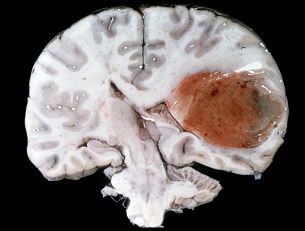BREAKING COVID-19 NEWS! Study Finds That COVID-19 Hospitalization Linked To Elevated Glioblastoma Risk - A Type Of Aggressive Brain Cancer!
Thailand Medical News Team Aug 21, 2023 1 year, 7 months, 4 weeks, 8 hours, 52 minutes ago
COVID-19 News: In an era dominated by the COVID-19 pandemic, the health vulnerabilities of various populations are increasingly being explored. Among these, individuals afflicted by glioblastoma (GBM), a particularly aggressive form of primary brain tumor, have garnered attention due to their high susceptibility to severe outcomes from the virus.

Nevertheless, the intricate relationship between GBM and COVID-19 infection remains shrouded in uncertainty. This intricate web has been further unraveled by a groundbreaking Mendelian-randomization (MR) study that has surfaced, offering a fresh perspective on the matter. Conducted by a collaborative effort involving the Jiangmen Central Hospital-China, The First Hospital of Jilin University-China, Cancer Hospital of Sun Yat-sen University-China, and the University of Texas at Arlington-USA, this study endeavors to elucidate the potential link between COVID-19 hospitalization and the heightened risk of developing glioblastoma.
The Pandemic's Impact on Vulnerable Populations
The pandemic's trajectory has borne the weight of almost 700 million COVID-19 Infections since its advent in 2019, resulting in a staggering global loss of life exceeding 6.9 million as covered in various
COVID-19 News reports. As researchers delved into the myriad ramifications of the virus, it became apparent that COVID-19 infections were correlated with acute cardiac and kidney injuries, acute respiratory distress syndrome, shock, secondary infections, and even cancer. The latter has proven to be a significant determinant in COVID-19 outcomes, dictating the severity of cases and influencing the necessity of intensive care unit admissions and invasive ventilation.
Among the multitude of cancer types, patients grappling with glioblastoma emerge as a uniquely vulnerable demographic. GBM patients often fall into the elderly spectrum and bear the burden of multiple age-related comorbidities. This vulnerability is exacerbated by the immunosuppressive effects of steroid medications frequently employed in treatment. Moreover, the prevalence of tumor and chemotherapy-related thromboembolic events is elevated, making this cohort more susceptible to infections. These factors synergistically heighten the risk of contracting and suffering severe outcomes from COVID-19.
The Enigma of GBM and COVID-19: Unveiling Causality through Mendelian Randomization
The primary objective of this study was to shed light on the causal relationship between COVID-19 hospitalization and the subsequent development of glioblastoma. To achieve this, the researchers harnessed the power of Mendelian randomization, a cutting-edge methodology that employs genetic instruments to evaluate causal relationships between risk factors and outcomes. Genetic instruments provide an avenue for researchers to disentangle confounding factors and establish causality in a way that traditional observational studies often struggle to achieve.
In their investigation, the research team leveraged data from a genome-wide association study (GWAS) encompassing European populations. The study's cohort consisted of 6,183 GBM cases and 18,169 controls. Employing a battery of MR techn
iques, including IVW meta-analysis, MR-Egger regression, and weighted-median analysis, the researchers scrutinized the associations between COVID-19 outcomes (infection, hospitalization, severity) and the development of glioblastoma.
Unveiling the Revelation: COVID-19 Hospitalization and GBM Risk
The study's findings shook the scientific community, illuminating a previously concealed link between COVID-19 hospitalization and an increased risk of glioblastoma development. Genetically predicted COVID-19 hospitalization emerged as a significant risk factor for GBM, with an odds ratio of 1.202, confidence interval of 1.035–1.395, and p-value of 0.016. This marked the first time that such a connection had been established, elevating the importance of targeted prevention and evidence-based treatment strategies for GBM in the context of COVID-19.
Biological Underpinnings: Unveiling Potential Mechanisms
Delving deeper into the intricate interplay between COVID-19 and GBM, researchers sought to unravel the biological mechanisms underpinning this newfound connection. The virus's interaction with the angiotensin-converting enzyme 2 (ACE2) receptor molecules on cell membranes was a key focus. Studies revealed that the viral spike (S) glycoprotein exhibited a higher affinity for the Vascular Endothelial Growth Factor Receptor (VEGFR) and the Epidermal Growth Factor Receptor (EGFR) in GBM cells, potentially contributing to the tumor's progression. This raised the possibility of COVID-19 infections hastening GBM development through unique brain predispositions to thrombosis triggered by cytokine storms.
Implications and Considerations for Future Research
The implications of this study are manifold. Firstly, it draws attention to the alarming risk posed by COVID-19 hospitalization for GBM development, necessitating enhanced prevention measures and tailored treatment strategies. Secondly, while genetically predicted GBM risk did not correlate with COVID-19 susceptibility, hospitalization, or severity, this information is invaluable for optimizing the allocation of medical resources.
Despite its groundbreaking nature, the study is not without limitations. The consistency of the direction of results among MR methods is a subject of consideration, and further research is warranted to validate the findings across different ethnic populations. Moreover, the study prompts a cascade of questions regarding the mechanism underlying the causal relationship between COVID-19 hospitalization and GBM development, urging the scientific community to probe deeper into this enigma.
In summation, the unveiling of the link between COVID-19 hospitalization and an elevated risk of glioblastoma development through Mendelian randomization heralds a new era of understanding in the realm of medical science. The intricate interplay between a global pandemic and the insidious progression of glioblastoma highlights the complexity of human health and the uncharted territories that remain to be explored.
The study findings were published in the peer reviewed journal: Frontiers In Oncology.
https://www.frontiersin.org/journals/oncology/articles/10.3389/fonc.2023.1185466/full
For the latest
COVID-19 News, keep on logging to Thailand Medical News.
